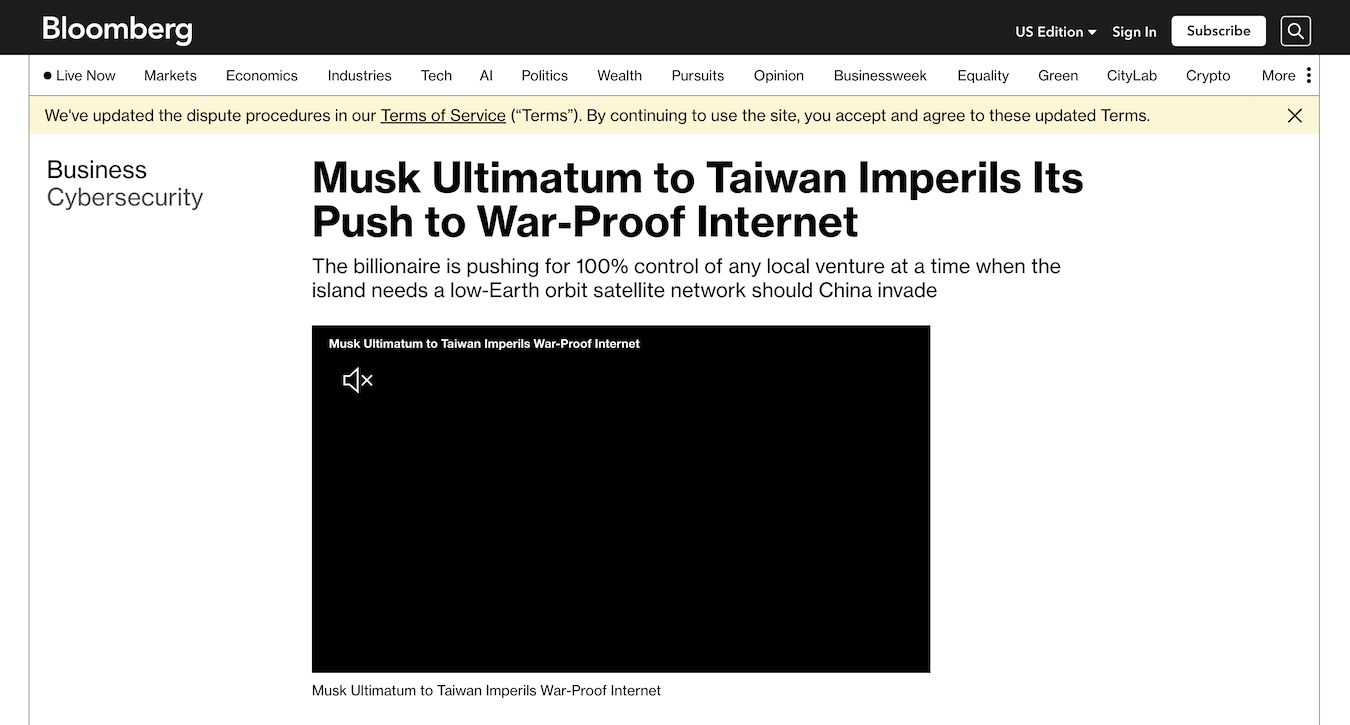by Brian Hioe
語言:
English
Photo Credit: US Air Force/Public Domain
A REPORT BY Bloomberg in July stated that Taiwan had sought to make up for its current vulnerabilities in Internet infrastructure with a deal with Starlink, but that the deal broke down due to Starlink owner Elon Musk.
In particular, there is increased concern as of late that 14 submarine cables link Taiwan to the world in terms of Internet connection. However, these cables could potentially be cut in wartime, in the event of a Chinese invasion.
There has been increased discussion of how submarine cables prove a vulnerability for Taiwan after Chinese vessels cut the two submarine cables for the outlying island of Matsu earlier this year. This could have been an accident, though for both cables to be cut is unusual.
Submarine cables connecting Taiwan and Matsu were cut 25 times in the last five years. As a result of the incident, Matsu’s 13,000 residents largely found themselves without access to the Internet. Sending a text message would take up to fifteen minutes.
In response to the incident, Chunghwa Telecom stated that it was upgrading its backup microwave system to allow for 3.8 Gbps to 4.382 Gbps by the end of June and 8.148 Gbps at the end of the year. Likewise, a fourth submarine cable connecting Matsu and the Taiwanese mainland is under construction.
Nevertheless, previously, there was not significant discussion of the potential vulnerability for Taiwan in wartime. Maintaining Internet connectivity would be important for Taiwan not only to maintain stable social order, but in terms of coordinating resistance. This would be true whether this was resistance within Taiwan itself or in terms of connecting Taiwan and potential allies.
Starlink would have potential uses in wartime in offering satellite Internet connection. However, in June, the Ministry of Digital Affairs announced that UK satellite company OneWeb would cover Taiwan by the end of 2023. Like Starlink, this also uses low-orbit satellites, though OneWeb currently only covers northern Taiwan.
 The Bloomberg article in question
The Bloomberg article in question
It was previously thought that this was due to concerns about the reliability of Starlink. Starlink is used in Ukraine to provide Internet connection, though the company has not allowed for it to be used by Ukrainian military drones, to some public criticism. At other points, owner Elon Musk has expressed statements perceived as pro-Russian, suggesting that he would potentially cut off access to Ukraine.
The Bloomberg report suggests, however, that Taiwan was previously in talks with Starlink but negotiations eventually broke down. This was due to Elon Musk wanting to own 100% of Starlink’s operations in Taiwan when Taiwanese laws would require joint ownership, so that Taiwanese companies owned 51%.
After Musk’s demands, it was then that negotiations broke down. Nevertheless, some have pointed to the dangers of Musk’s links to the Chinese government, seeing as manufacturing for his electric vehicle venture, Tesla, largely takes place in China.
In response, the Taiwanese government has stated that it intends to expand domestic development of satellites. In 2019, the Tsai administration pledged to invest 25.1 billion NT into the space industry over the next decade. Likewise, the aim is to increase the output of the space industry to over 1 trillion NT by 2019.
Taiwan will need 20 to 30 satellites for a minimum cluster and 120 for a cluster that can cover Taiwan without uninterrupted coverage. Though China has the capacity to shoot down satellites, dealing with larger clusters would prove more difficult. At the same time, with the Taiwanese space industry in its infancy, Taiwan will require the help of external actors to strengthen capacity.
It is to be seen if such aid would be forthcoming from the US or perhaps Japan. Apart from developing domestic satellite technology, Taiwan would need to increase its space industry, and in this way, boosting satellite capacity will prove a two-fold challenge.
Furthermore, it proves concerning that a critical infrastructure vulnerability in the event of a Chinese invasion was not widely discussed in the public sphere until relatively recently. It may be worth pushing for further discussion of what Taiwan’s vulnerabilities would be in the event of a Chinese invasion, as there may be a number of similarly under-discussed vulnerabilities. Although there is increased discussion of military affairs in Taiwan as of late, this may still be long away.

